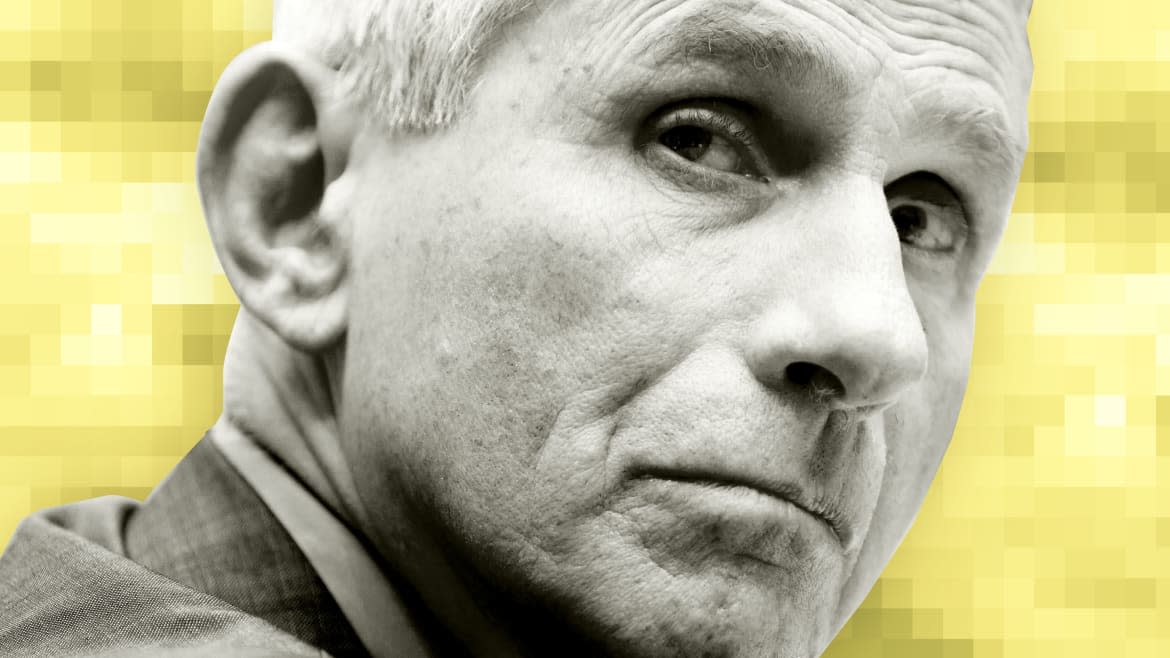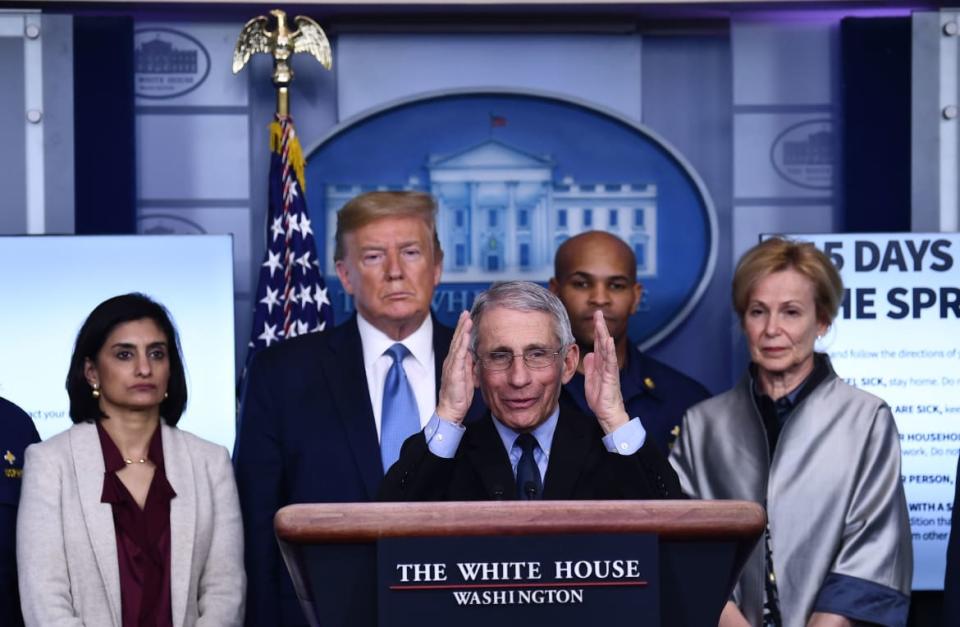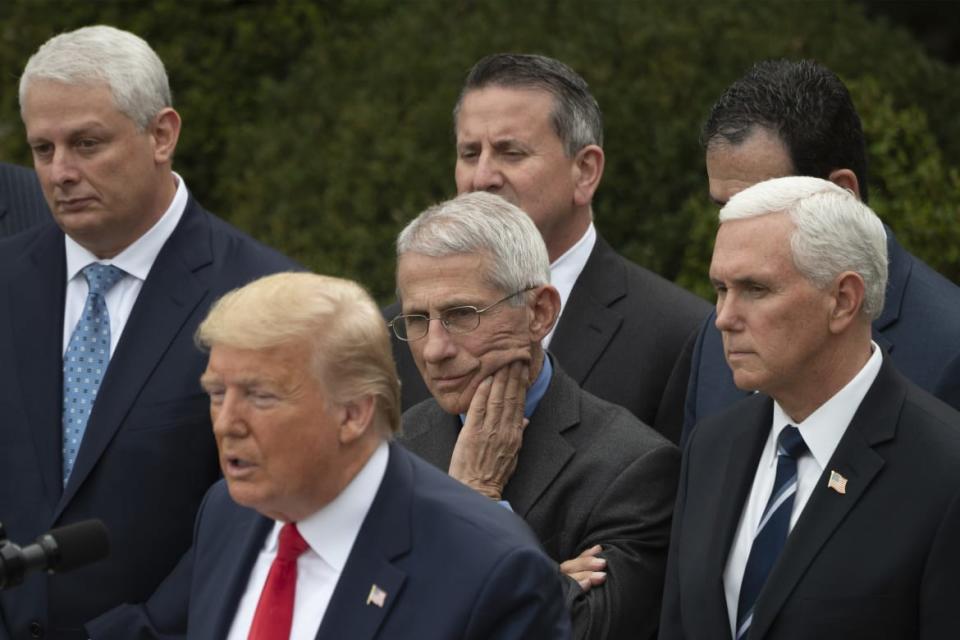In Dr. Fauci We Trust

As he guides the nation through the coronavirus crisis, Dr. Anthony Fauci has been in regular communication with an unlikely comrade from our last big war against a virus.
“I usually correspond with him after he appears on television,” the 84-year-old AIDS activist and playwright Larry Kramer told The Daily Beast. “He just says, ‘Hunker down.’ I tell him, ‘You’re looking tired.’”
When Fauci first rose to his present position as director of the National Institute of Allergy and Infectious Diseases in 1984, Kramer viewed him as the personification of the government’s failure to address the epidemic that was devastating the gay community. Kramer called Fauci a “murderer” and published a “An Open Letter to Anthony Fauci, an Incompetent Idiot.’”
But when protesters affiliated with an organization founded by Kramer held a rowdy protest at the NIH headquarters outside Washington, D.C., Fauci asked the police to refrain from making arrests. He then invited the protesters into his office for a talk.
In 1989, Kramer organized an AIDS conference in Montreal. Fauci decided to attend and Kramer chanced into him as the activist was walking his dog, Molly, outside the hotel at night. The two men continued on with Molly, talking about the virus that was their common enemy.

The following night, Kramer arranged for some of the brightest and best-informed of his fellow activists to meet in his hotel room with Fauci.
“He realized they were smart,” Kramer told The Daily Beast on Monday. “That was the beginning of the breakthrough we had with him.”
Kramer was then pushing for the government to accelerate the approval of experimental drugs for those who have no other hope and to seek the input of patients when designing clinical trials. Fauci once remarked that the history of modern medical research could be divided into two periods.
“Before Larry, and after Larry,” Fauci said.
A strong bond formed between them as they battled the virus together.
“A close friend,” Fauci has said of Kramer.
Kramer, on his part, said, “We’re good friends now.”
That did not stop Kramer from shouting at his newfound friend when the two appeared on a TV news show together about AIDS. Fauci later recounted a phone call he received from Kramer afterward.
“What do you think?” Kramer asked. “I thought it went really well.”
“What can I say?” Fauci replied. “Larry, I love you.”
On occasions when Kramer came to Washington, Fauci would take him out for an Italian dinner.
Dr. Fauci Schools Hannity on Dangers of Coronavirus
Now a new virus has hit. Kramer feels like he is back in the days of AIDS.
“It’s interesting, the similarities between then and now,” Kramer said on Monday. “It’s almost like going back in time. Life was so awful for us then, just like it is now for everybody.”
Now, instead of appearing with Fauci on television, Kramer watches from his downtown Manhattan apartment as his one-time foe-turned-friend stands at the White House with President Trump and Vice President Mike Pence. Kramer knows Fauci well enough not to be so amazed by his ability to gently correct a Trump misstatement and introduce actual truth to the coronavirus briefings.
Afterward, Kramer and Fauci exchange emails.
“He wanted to know how I was doing and making sure I was following all the rules—I mustn’t go out and all that,” Kramer told The Daily Beast.
Kramer noted that among the differences between this epidemic and the last is that Fauci had not yet risen to director of NIAID in the early AIDS years.
“He had no power then at all,” Kramer said.
This time, Fauci has been in charge from the start.
“Thank God,” Kramer said.
Dr. Anthony Fauci Gives Americans Hard Facts on How to Save Themselves from the Coronavirus
The doctor to whom everybody from Kramer to Trump look to lead us from the present calamity was born on Christmas Eve 1940, the second child and only son of Eugenia and Stephen Fauci. His father was a pharmacist known in the Brooklyn neighborhood of Bensonhurst as “Doc.” The family lived in an apartment above the pharmacy where the father worked in the back, and the mother and the daughter, Denise, worked in the front.
“I was delivering prescriptions from the time I was old enough to ride a bike,” Fauci would remember.
Young Anthony Fauci would also fetch quarts of ice cream for 300-pound Father Pascquale Visci, who would sit outside the rectory of St. Bernadette’s Church across from the pharmacy. Fauci was independent-minded enough to be a Yankee fan in Brooklyn Dodger territory, but he made up for the sacrilege as a shortstop on the St. Bernadette’s parish team, when he hit a home run in a big game against the Major Meat team. He also played basketball, making up for his modest stature with a knack for stealing the ball. He was never late for practice.

Dr. Anthony Fauci looks on as President Donald Trump speaks during Rose Garden press conference.
A 70-minute, one-bus, three-subway train commute took him to Regis High School in Manhattan. He continued his Jesuit education at the College of the Holy Cross, working construction in the summer. By chance, he ended up working on a new library at Cornell Medical College in Manhattan. He recalled to Regis Alumni News sneaking into the Cornell auditorium during a lunch break.
“I got goosebumps as I entered, looked around at the empty room and imagined what it would be like to attend this extraordinary institution,” he remembered. “After a few minutes at the doorway, a guard came and politely told me to leave since my dirty construction boots were soiling the floor. I looked at him and said proudly that I would be attending this institution a year from now. He laughed and said, ‘Right kid, and next year I am going to be police commissioner.’”
In 1968, Fauci signed on with the Public Health Service and worked at the National Institutes of Health. He never left, even married a Portuguese-speaking research nurse he met there when he needed a translator for a patient. He became known for working 16-hour days, being remarkably organized, and jogging seven miles daily in all weather. He took Sundays off to be with his wife and three daughters.
In the midst of the AIDS crisis, he became head of NIAID at NIH and was called a hero by both Kramer and President Bush. He twice turned down offers to become head of the parent agency, NIH.
At one point, a reporter asked if he ever found the battle with the AIDS virus to be dispiriting and overwhelming.
“If you’re asking whether I have fears, pain, and anxieties, yes of course I do,” he replied. “That’s a natural human thing. But do you mean have I ever let them interfere with my responsibilities or get in the way of my work? No. Not once.”
The Next Plague Is Around the Corner
He told Current Biography magazine, “You can’t match the excitement of knowing you’re doing something for humanity.”
He was asked for his personal motto. “Always strive for excellence,” Fauci said.
The pharmacy in Bensonhurst is long since gone, and a woman at St. Bernadette’s Church on Monday said that the old neighborhood people who would remember it have either passed on or moved away. But you can stand at the corner of 13th Avenue and 83rd Street and picture little Anthony Fauci pedaling his delivery bicycle right on to true greatness.
And amidst all the excellence he is displaying in the fight against the coronavirus, he makes sure to ensure that his advice to hunker down is being heeded by his old comrade in the last great war against a virus.
“I haven’t left my apartment,” Kramer reported to The Daily Beast on Monday.
Get our top stories in your inbox every day. Sign up now!
Daily Beast Membership: Beast Inside goes deeper on the stories that matter to you. Learn more.

